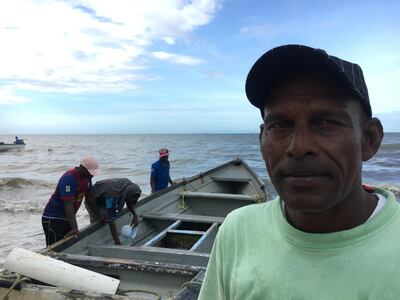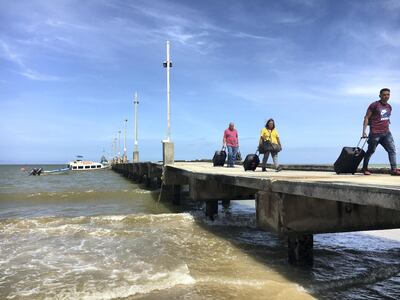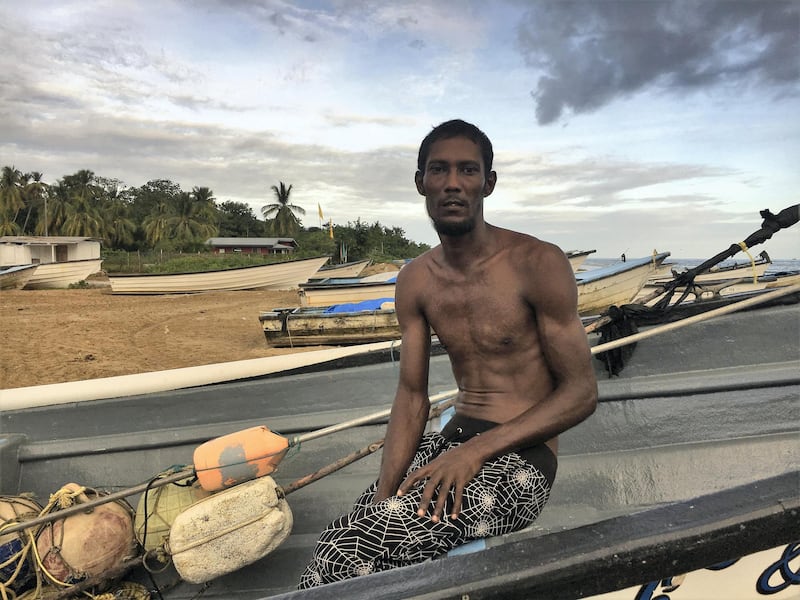To prove how perilous his Caribbean fishing grounds have become, Candy Edwards needs only to roll up his T-shirt sleeve. At first glance, the neat scar on his arm looks like it might be from a shark bite. Instead, it came from a predator long thought to be extinct in these waters – pirates.
"They came straight for us in their boat, firing their guns," says Mr Edwards, a wiry 35-year-old from the fishing village of Icacos on Trinidad's south-west tip. "We knew they'd try to kidnap us, so we cut our nets and fled, but they chased us right to the shore. I didn't realise I'd been hit by one of the bullets until I got home and fell down in front of my house."
Once a peaceful fishing community where the only trouble was the odd bar brawl, today all too many of Icacos's fishermen have a tale to tell of being chased, robbed, or kidnapped at sea. Yet unlike the Hollywood blockbuster starring Johnny Depp, there is little romance to this real-life Pirates of the Caribbean tale.
Rather than swashbuckling buccaneers, most of today’s pirates are penniless fishermen from nearby Venezuela, where the economic meltdown of recent years has tempted many into banditry.
As the southernmost island in the Caribbean, Trinidad lies well within the pirates' reach. Icacos is less than 15 kilometres from the Venezuelan mainland, across an aptly-named channel called the Serpent's Mouth.
In the last two years, as hyperinflation has rendered Venezuela's currency worthless, piracy attacks have taken place nearly every week, according to Esook Ali, president of the Icacos Fishing Association.
Such is the threat that in villages like Icacos, local fishermen have taken to upgrading the engines on on their fishing pirogues from 75 to 200 horsepower in the hope of outrunning the pirates. It doesn't always work, as Mr Edwards learned during a previous run-in with them in 2015.
"Their boat went much faster than ours, and they pulled machine guns on us and forced us to stop," he said. "First they they jumped on board and beat us up, then they tied up my two friends and I and took us back to Venezuela."
The kidnappers spirited them to Guiria, a once-prosperous Venezuelan fishing port where pirate gangs now operate with near-impunity. Mr Edwards and his two fellow prisoners were held hostage in nearby woodlands for seven days.
"The cage had clearly been made for kidnapping people," he said. "They would kick and spit at us whenever they walked past us. They demanded a $35,000 ransom – the community here in Icacos had to have a whip-round to pay for it."

The surge in ocean banditry has worrying parallels with the Somali piracy crisis of a decade ago, where once again, the problem started with jobless fishermen who took to robbing passing ships. Security experts fear it shows that like Somalia, Venezuela is now becoming a failed state.
Once one of Latin America's wealthiest countries, oil-rich Venezuela has been in crisis since 2015, when the fall in world energy prices dealt a body blow to the "Chavista" socialist regime set up by the late Hugo Chavez. With inflation now at one million per cent annually, shops and hospitals are empty of goods, forcing more than three million Venezuelans to flee abroad.
Last May, President Nicolás Maduro was accused of vote-rigging to get re-elected, while violent clashes between security forces and opposition supporters have prompted fears of civil war. In sign of the growing lawlessness, some of the piracy is allegedly being carried out by the Venezuelan coast guard, who "arrest" Trinidadian fishermen on spurious charges.
Vijay Hajarie, 53, said he spent seven weeks in a Venezuelan jail after being falsely accused by the Venezuelan coast guard of poaching in their waters.
"First they demanded we pay $3,000 on the spot, which we didn't have," he said. "Then, when they towed us away to Venezuela, they took photos of our vessel next to a stretch of Venezuelan coastline. They showed the judge the photos to prove we'd been in Venezuelan waters, and we had to pay a $500 fine to get out."

In the port of Cedros, a short drive along the coast from Icacos, groups of desperate Venezuelans now arrive every week, swelling the refugee population that already stands at about 40,000. Others come purely for shopping, buying nappies, rice, flour and other basics that can be sold in Venezuela for four times the price.
Holding up his smart-phone, one refugee explained the problem via Google Translate. "All high-need product in Venezuela is very expensive," the message read.
Food smuggling is not the only flourishing trade. The pirates and a minority of the Venezuelan incomers are also smuggling drugs and guns into Trinidad, fuelling gang crime in the slums of the capital, Port of Spain. Last year, Trinidad's murder rate topped 500 – a lot for a country of just 1.3 million people. Trinidad's police make regular seizures of cocaine, marijuana and guns, with some of the weapons sold onto the black market by Venezuelan soldiers and police.
Venezuela has long been a conduit for Colombia's cocaine trade, thanks partly to Mr Chavez's hostility to the US-led Drug Enforcement Agency, whose staff were ordered to leave Venezuela in 2005. In the last three years, Washington has accused several senior figures in Mr Maduro's government of drug trafficking.
While the Maduro regime has dismissed the accusations as American imperialist propaganda, law enforcement officials in Trinidad are rather less sanguine. They fear that the more chaotic Venezuela becomes, the more its neighbours will suffer too.
"As far back as 2006, people could go to Venezuela and trade a few bags of sugar and rice for a handgun," said one former Scotland Yard detective who used to advise Trinidad's police service. "Now Venezuela is even more burnt out than it was, and so even more people are getting into smuggling."
_______________
Read more:
Venezuelan bandits look abroad as currency crisis means crime no longer pays
Maduro says US behind 'assassination plot' involving Brazil and Colombia
_______________
The Trinidadian government, which maintains good relations with Venezuela and recently signed a major gas deal with Caracas, declined to comment to The National. But its own coast guard and police have been accused of not doing enough to stop the pirates and smugglers. According to Shankar Teelucksingh, a Cedros councillor, this is either due to bribes, incompetence, or an unwillingness to upset the Venezuelan authorities.
"All kinds of illegal stuff is now coming into our country," he said. "But our government lacks the will to stop it because they want to maintain cordiality with Venezuela. You can see the social impact that will have – and meanwhile, our fishermen are afraid to go out to sea."






